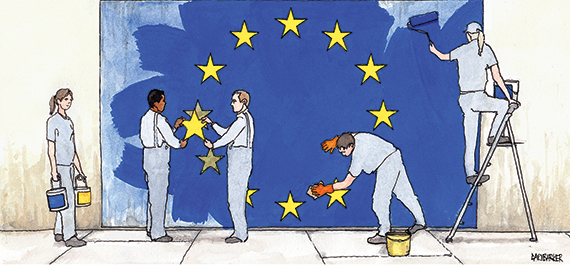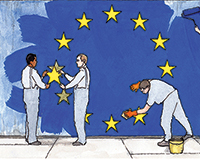 It is just over one month until the EU referendum. But for me the Brexit story started when the UK was offered the chance back in 1975 to vote to “remain in the Common Market” two years after we’d joined in 1973.
It is just over one month until the EU referendum. But for me the Brexit story started when the UK was offered the chance back in 1975 to vote to “remain in the Common Market” two years after we’d joined in 1973.
It was about the same time that I joined the RAC club in London’s Pall Mall.
When I went for my interview for the RAC, I was told that the club had a snooker room, bar, restaurant, library, swimming pool and a golf and country club.
The predecessor to the European Union, the Common Market offered similar advantages on an economic but not political basis. It made sense to me to have these available to us if we were to expand our economy and our European horizons.
Prime minister Edward Heath was optimistic that Britain’s membership of the community would bring prosperity to the country. He said: “We will find there is a great cross-fertilisation of knowledge and information, not only in business but in every other sphere,” and that “this [would] enable us to be more efficient and more competitive, not only in
Europe but in the rest of the world.”
I wouldn’t have joined the RAC if I had been told that I would have to swim on a Monday, eat in the restaurant on a Tuesday and play snooker on Wednesday. Nor would I have voted to remain in the EU if I knew it would dictate the shape of our bananas, interfere with UK law making, add to our bureaucracy and erode our sovereignty.
This said, you could imagine that I am a Brexit supporter. But I’m not.
I will be voting to stay in because I believe that it is in Britain’s economic interest to do so. We have a solid economy even with the shortcomings of the European Union.
Since the global financial crisis, we have fought our way back and are now enjoying the benefits of a stable economy with continued growth, and all of this from within the European Union.
There are imperfections but I believe we are best placed to put those right by remaining in, not by leaving.
The last thing that the UK needs is a period of uncertainty. This is simply not a risk worth taking when in reality the issues that concern us all are not economic, but relate more to the way in which others seek to govern our thinking, our actions and our law making.
We can still fight for these issues while remaining in the EU and without damaging our economic performance or prospects.
I believe, however, that irrespective of the result, the EU will not exist in its current form within five or 10 years.
A vote to leave by us would soon be followed by others and prompt the breakup of the EU, whereas a vote to stay in will also, eventually, lead to the breakup of the EU.
Twelve EU members are known as net beneficiaries, which receive more in benefits than they pay in membership fees; they are simply not all travelling at the same speed nor in the same direction. I can see no alternative to some people concluding that this disparity means that Europe in its current form is neither sustainable nor attractive.
Our debate and referendum will become the template for the rest of Europe.
Paul White is chairman of Frogmore











